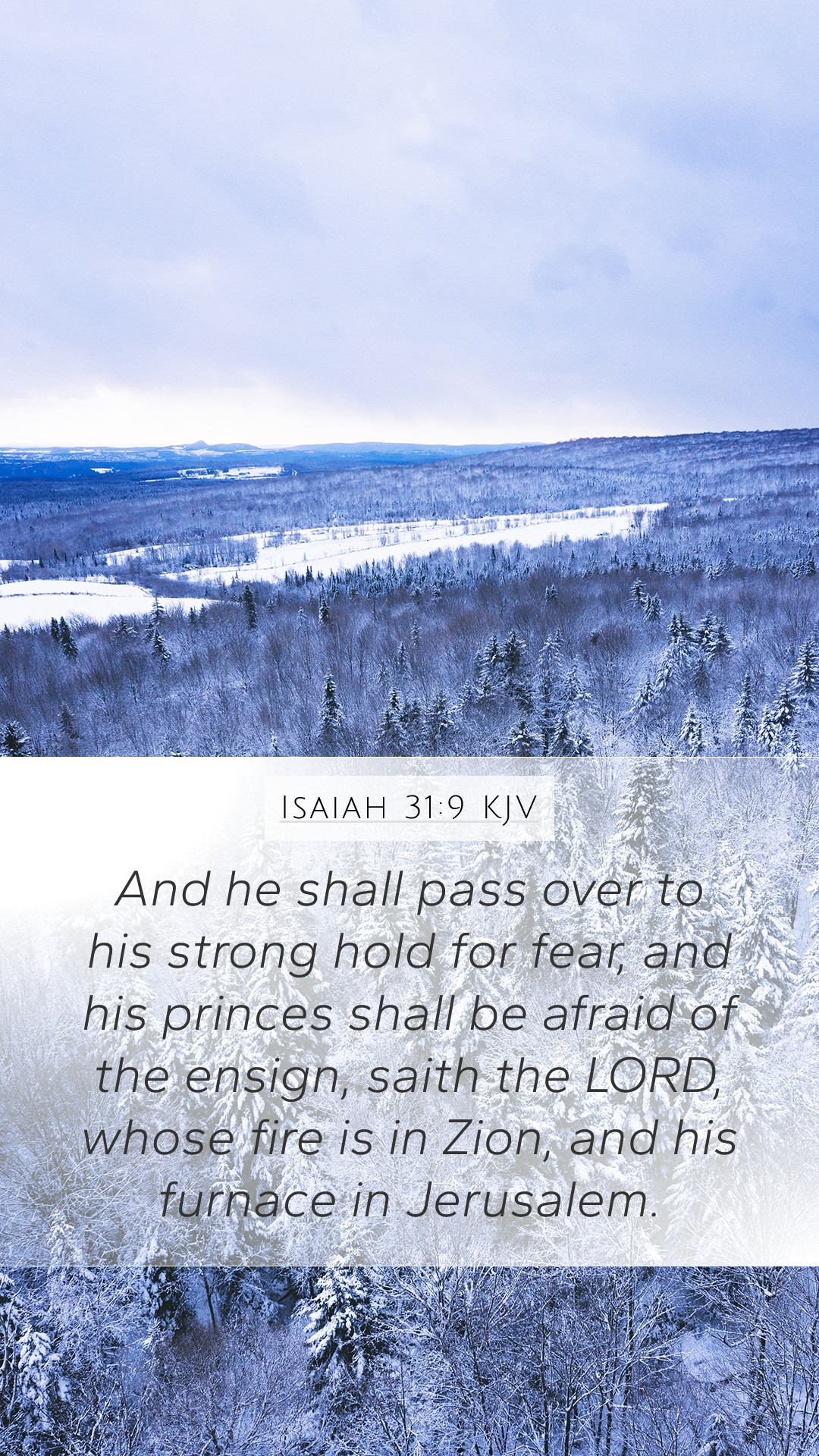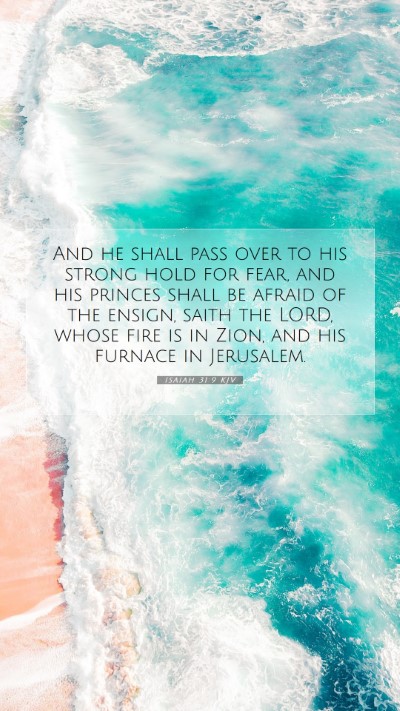Understanding Isaiah 31:9: A Comprehensive Commentary
Isaiah 31:9 states, "His rock shall pass away by reason of fear, and his princes shall be afraid of the ensign, saith the Lord, whose fire is in Zion, and his furnace in Jerusalem." This verse presents a profound reflection on the futility of human strength and the sovereignty of God in the face of impending judgment.
Contextual Background
To comprehend Isaiah 31:9, it is essential to recognize the historical context in which Isaiah was prophesying. During this period, the people of Judah were facing the threat of Assyrian invasion. Instead of turning to God for help, they looked to Egypt for military assistance. This reliance on human alliances exemplifies a profound spiritual failure. The subsequent admonishments from God through Isaiah serve as a poignant reminder of the consequences of misplaced trust.
Verse Breakdown and Analysis
- His rock shall pass away by reason of fear: This metaphorical rock symbolizes the security and might that the leaders of Judah believed they found in Egypt. The 'rock' that they turned to for strength would ultimately fail them due to the fear instilled by God’s impending judgment.
- His princes shall be afraid of the ensign: The 'princes' or leaders of Judah will be paralyzed by fear when faced with overwhelming odds. Instead of offering leadership and courage, they are depicted as trembling and anxious, highlighting the futility of placing confidence in earthly powers.
- Saith the Lord, whose fire is in Zion: The reference to God's fire signifies His presence, judgment, and holiness. Zion, representing Jerusalem, is where God’s judgment and refining fire will be felt most intensely. This reinforces the notion that God is both a protector and a judge.
- His furnace in Jerusalem: The imagery of a furnace underscores the process of purification and judgment that would occur. Just as metals are refined in fire, God's people would undergo a similar process, which may lead to suffering but ultimately results in redemption.
Integrated Insights from Commentators
Insights from notable biblical scholars offer a rich understanding of this verse:
- Matthew Henry: Henry emphasizes the broader lesson of dependence on God over human alliances. He remarks on the foolishness of looking to Egypt when God is the ultimate protector. The imagery of the furnace speaks to God's intentions to purify, indicating that trials serve a divine purpose.
- Albert Barnes: Barnes draws attention to the impending calamities that face those who trust in worldly powers rather than God. His commentary highlights the assurance that even in judgment, God maintains His presence and will eventually restore His people.
- Adam Clarke: Clarke's analysis revolves around the symbols in the text. He notes that the 'fire' and 'furnace' represent God's protective yet purifying nature. Clarke stresses the importance of recognizing God's authority over all nations, encouraging believers to remain steadfast in faith.
Theological Implications
Isaiah 31:9 resonates with significant theological themes:
- Human Frailty: The passage illuminates the fallibility of human efforts, reinforcing the idea that true security and strength come from God alone.
- Divine Sovereignty: It emphasizes God's control over world events and nations, assuring believers that no earthly power can stand against His will.
- Judgment and Restoration: The text depicts God's judgment not as a finality but as a beginning of restoration, portraying hope amid dire circumstances.
Application in Daily Life
Understanding Isaiah 31:9 has practical implications for contemporary believers:
- Trusting God: It reminds Christians to place their trust in God rather than worldly systems or allies. In times of distress, the faithful are encouraged to seek God's counsel and strength.
- Preparing for Trials: The verse prepares believers for the reality of trials and tribulations, instilling the conviction that these experiences serve a purpose in God's plan.
- Embracing God’s Presence: Recognizing God as the ever-present force in their lives will help believers be resilient and steadfast, confident in His ultimate justice and plan for restoration.
Cross References
Several key Bible verses complement the themes found in Isaiah 31:9:
- Psalms 20:7: "Some trust in chariots and some in horses, but we trust in the name of the Lord our God." This reflects the same sentiment of reliance on divine support over human strength.
- Isaiah 28:17: "I will make justice the measuring line and righteousness the plumb line..." This verse parallels the theme of judgment and righteousness found in Isaiah's prophecies.
- Jeremiah 17:5-6: "Cursed is the man who trusts in man and makes flesh his strength..." This reinforces the idea of the futility of misplaced trust in human power.
Conclusion
Isaiah 31:9 serves as a powerful reminder to all believers regarding the significance of relying on God's strength rather than human means. Through understanding the fear, purification, and sovereign authority described in this verse, individuals can apply these insights in their daily lives and grow in their faith. Engaging in personal or bible study groups, utilizing bible study tools, and participating in online bible study can facilitate a deeper understanding of scripture and enable Christians to navigate life's challenges with biblical wisdom.


